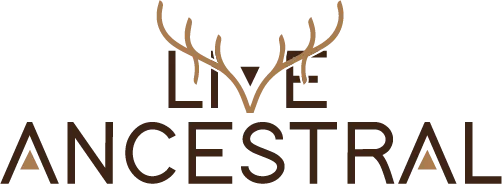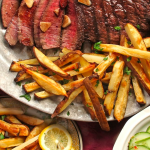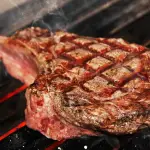The carnivore diet is a high-fat, low-carb diet with tremendous health benefits. However, just like any strict elimination diet, many people experience mild side effects as their body adapts to different foods.
For example, short-term side effects like diarrhea and constipation are common in the first week of starting the diet. Long-term side effects are rare, but can be an issue for people with pre-existing health conditions.
In this article, we’ll explain all the possible carnivore diet side effects, what causes them, and how to fix them fast — so you can make the best choices for your health.
TABLE OF CONTENTS
Diarrhea
Carnivore diet diarrhea is the most common side effect of eating only animal products. It’s caused by your gut microbiome changing and bad bacteria dying off.
Our gut is home to billions of bacteria and microorganisms, some helpful and some harmful. All these microorganisms feed upon carbohydrates and are essential in regulating some vitamins and giving us the feeling of fullness. When your body lacks carbohydrates, as it does on the carnivore diet, these bacteria do not get enough to feed upon and many of the bad ones die off. Our gut removes these bacteria through feces with a lot of water. This may result in diarrhea.
Diarrhea during the transition phase of the diet can be treated by drinking more water and staying hydrated. Consuming electrolytes via carnivore diet bone broth, soup, or c carnivore diet drink like sparkling water and salt is the best cure.
Constipation
Constipation on the carnivore diet is also common, and many people find they have decreased bowel movements.
The cause is due to eliminating fiber-rich veggies and grains from your diet, and fiber makes up the bulk of your stool. A sudden lack of fiber and probiotic bacteria in your diet can lead to constipation.
This is not a long-term issue at all though, because dietary fiber actually causes constipation rather than fixes it. Most people find that after the transition period, their bowel movements are smoother than ever, because they’re actually absorbing the nutrients from their food.
You can speed up the process by taking ox bile supplements and probiotics to aid your digestion.
Headache and Lethargy

A lot of people find that the carnivore diet gives them a headache when they first start it, and they feel like they have no energy at all. This is often called the “keto flu” because as your body transitions into ketosis and burning fat for fuel, you feel like you have the flu.
Expect lethargy, brain fog, headache, body aches, irritability, and sleeping problems for up to several weeks, as a result of low blood sugar and dehydration as your body passes sodium.
If you don’t want to ride it out, the best thing to do is take an electrolyte supplement to replenish the lost electrolytes. Try to keep busy during this period, and don’t worry — the feeling will pass and you’ll soon feel amazing.
Leg Cramps
Another commonly observed side effect associated with starting the carnivore diet is leg cramps.
Though there is little data on why people on a carnivore diet get leg cramps, it is thought to be the result of electrolyte imbalance. Excess levels of stress can also contribute.
Other than taking electrolytes, the best thing to do is rest. Once your body adapts to the new type of food, your cramps will likely disappear.
Nausea
Suddenly depriving your body of carbohydrates when starting the carnivore diet can give you strong feelings of nausea. The feeling could last for several days to more than a week.
This side effect is linked to low blood sugar levels and a change in the gut. Change in the composition of the gut microbiome through complex interactions with the brain contributes to nausea, and the upregulation of enzymes needed to digest high amounts of fats takes some time.
Stay hydrated, rest, and eat as much healthy fat as possible to speed up the transition.
Heart Palpitations
Heart palpitations on the carnivore diet feel like a serious side effect, but the causes are usually mild.
Palpitations are audible heartbeats that give you the feeling of an abnormally fast and pounding heart. The way our heart pumps is greatly affected by the volume of fluids and electrolytes in our body.
Decreased fluids make the heart beat faster and stronger to ensure that every body organ gets enough blood and oxygen. If your fluids are low, that means you’ve lost electrolytes.
Therefore, the best way to stop heart palpitations is to rehydrate and increase your electrolyte intake.
Sugar Cravings
One of the most difficult parts of adapting to the carnivore diet is giving up sugar if you’ve been used to eating a high-carb diet with lots of snacks and junk food. Expect strong sugar cravings when you start the diet.
The cravings are the result of low blood sugar. Insulin shuts off fat metabolism by decreasing lipolysis and increasing the tissue’s triacylglycerol and fatty acid synthesis. This decreases your energy levels, and you get strong sugar cravings.
Whatever you do, don’t give in and eat something sweet. The carnivore diet works because it’s almost zero-carb. Even though honey is allowed on the carnivore diet, it’s best to avoid it within the first few weeks as it might make your cravings worse. Stick to just meat and salt.
Long-Term Side Effects
Long-term side effects on the carnivore diet are rare. In reality, eating only animal products treats many health issues because of how the carnivore diet decreases inflammation in the body.
However, some people do notice the following due to pre-existing health issues, or poor food choices.
Potential Vitamin Deficiencies
If you eat a nose-to-tail carnivore diet that includes a whole list organ meats, you’ll get all the nutrients you need. However, if you’re not eating foods like beef liver, and are mostly eating low-quality meat or processed meat products, there is a chance of nutrient deficiencies.
Many people do just fine eating only beef and salt (known as the Lion Diet) because it improves how the body actually absorbs nutrients from food. Others though might miss certain nutrients that aren’t as prevalent in meat, like Vitamin C and Vitamin K.
If you have a genetic predisposition to Vitamin C deficiency disease, there is a risk of getting scurvy if you don’t consume enough Vitamin C. A good solution is to switch to a carnivore diet with fruit a few months in when your body and gut have healed enough to process the extra carbs,
Vitamin K helps clotting blood, so people who have a genetic disposition to lacking Vitamin K may get bleeding disorders, and Vitamin E deficiency may also result. Cheese is a good source of Vitamin K, and cheese on the carnivore diet is allowed if you can tolerate dairy.
A solution is to take a multivitamin. We recommend a high-quality beef liver supplement to make sure you’re getting all the vitamins you need in a natural way.
Risk of Coronary Artery Disease and Gout
The carnivore diet is often considered unsuitable for people already suffering from cardiovascular problems, including blood pressure issues and hypercholesterolemia (high cholesterol in the blood). The carnivore diet is rich in sodium and can aggravate blood pressure issues. Plus, levels of bad cholesterol (LDL) in the blood could be increased due to the high-fat content of the carnivore diet.
Before starting the carnivore diet, you should get your cholesterol and uric acid profile checked by a registered doctor.
The carnivore diet can also aggravate gout. Gout is a medical condition resulting from abnormal purine metabolism, leading to a high uric acid level in the body. Crystals of uric acid accumulate in the joints, and this results in Gout. A high protein intake is thought to make gout worse.
The research on the carnivore diet is still in its early days, so it’s possible that these conclusions will change — but for now, it’s best to exercise caution if you have these pre-existing medical conditions.
Kidney Stones
For many people, the carnivore diet can help treat kidney stones — but others find it causes them.
Increased uric acid due to high meat intake can lead to kidney stones, and in addition to accumulating in joints, uric acid also accumulates in the kidneys. As a result, uric acid-type stones are formed in the kidneys.
Plus, when you start a carnivore diet, glycogen is lost, releasing a lot of bound water. This water is excreted through the kidneys, so you may need to pee more often during the transition period. If you already have kidney disease, your kidneys may not efficiently excrete this large amount of water, resulting in fluid overload in the body and hypertension.
Key Takeaways: Curing Carnivore Diet Side Effects
While short-term side effects such as diarrhea and headache are common when starting the carnivore diet, these are usually due to the body adapting and go away within a few days to a few weeks. Most are caused by issues relating to dehydration and bad bacteria in the gut dying off, the best cure is to take an electrolyte supplement to replenish salts, or ox bile to help digestion.
Long-term side effects are rare compared to the short-term side effects, and they are usually due to pre-existing medical conditions.









I went cold turkey carnivore 1 week ago. I’m 72 but in fairly OK health. Only take 1 grain of thyroid.
Everyone talks about diarrhea. I’ve had none. Instead constipation.
I have no gallbladder but my liver produces lots of bile. My stool is always dark brown.
Half hour or hour after a meal I gel really nauseous and the feeling of acid indigestion.
I’ve always been low on stomach acid and never have reflux. I took four 790 mg of betaine HCI as I usually did after a meal but it made no change to the acid indigestion feeling along side the nausea.
When I lay down at night on my back as usual the nausea burn feeling gets way worse. so lay on my side.
My heart beats harder and faster @85-110. By morning the rate has slowed to 70-80.
My fasting blood sugar is 100-110 before or after a meal. blood pressure hovers around 135/85-145/90.
Other than that everything is great lol.